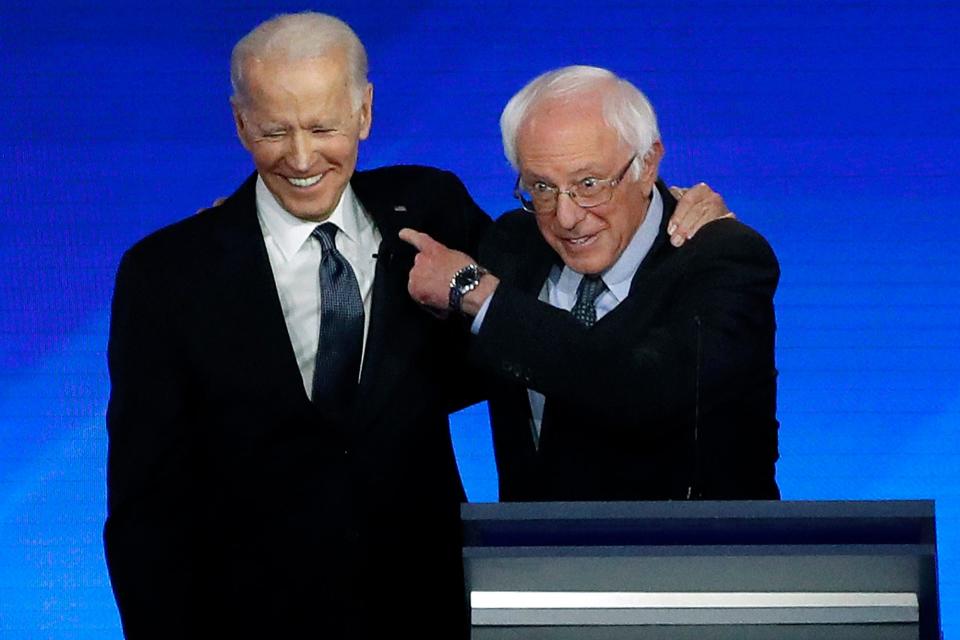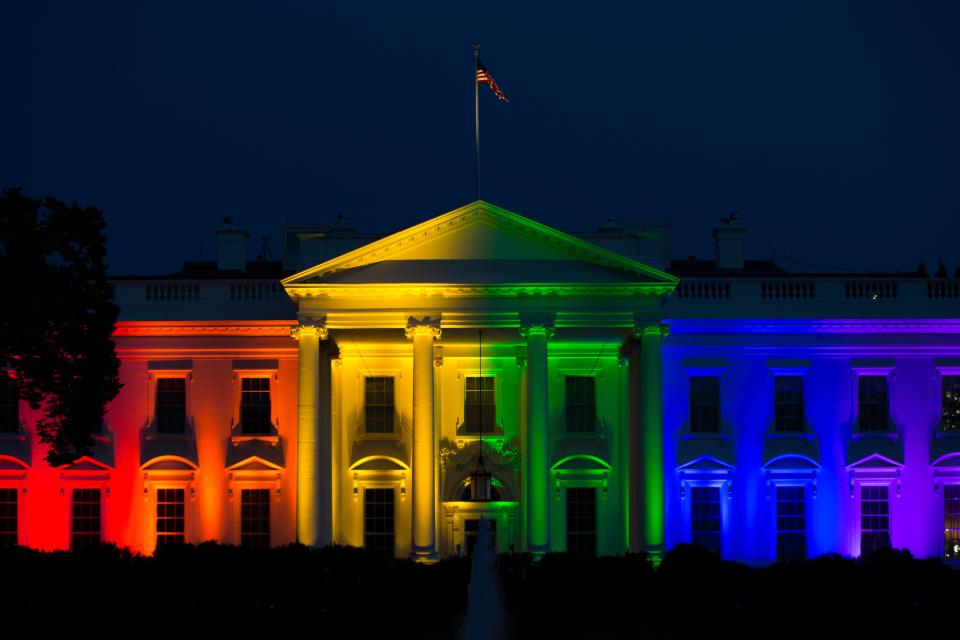Joe Biden, Bernie Sanders spar over long records on trade, entitlements, guns and Iraq as primaries push on
WASHINGTON – Former Vice President Joe Biden and progressive Sen. Bernie Sanders are sparring in the Democratic primaries over how to steer the party to unseat President Donald Trump.
Each candidate said he would support the other as nominee. But as they battle for the nomination from state to state, their long public records reveal wide-ranging disputes on economics – trade, bankruptcy or entitlements – and security, such as gun control or the war with Iraq.
The Michigan primary Tuesday will shine a spotlight on the federal federal bailout for the automobile industry. But disputes over health care and other issues could linger to the nominating convention in Milwaukee in July.
Sanders describes his campaign as unprecedented for taking on the country's corporate establishment "that is working frantically to try to defeat us," including Wall Street, insurance companies and the fossil-fuel industry.

“The American people have got to understand that this is a conflict about ideas, about a record, about a vision for where we go forward,” Sanders told reporters Wednesday. “I look forward to a serious debate on the serious issues facing this country.”
But Biden described himself as a pragmatic leader who got things done in the Senate and as vice president. Biden said he would be more likely than Sanders, as a Democratic socialist, to help his party regain control of the Senate by winning swing states.
“It's not about a revolution,” Biden said Feb. 26 at a CNN town hall. “It's about results.”
Here's a look at several key issues where the candidates differ:
Federal bailouts
The success of the auto-industry bailout a decade ago is something Biden promotes often. It began under Republican President George W. Bush and expanded under Democratic President Barack Obama.
But the role of the auto bailout within a much larger package of aid to the banking industry led to a clash between Biden and Sanders.
The auto bailout helped General Motors and Chrysler weather the Great Recession – and the companies repaid the federal government for the help. By the end of 2018, $63 billion was repaid, the government received $8.4 billion in income and about $16.6 billion was written off as a loss, according to a Congressional Research Service report.
“I was proud to serve as President Obama’s vice president for eight years, and what we were able to accomplish, passing Obamacare to the work we did to rescue the auto industry and the nation’s economy,” Biden told reporters Wednesday.
Michigan Gov. Gretchen Whitmer and former Gov. Jennifer Granholm each endorsed Biden, saying he was the official who championed the auto industry and the millions of Midwest jobs that depend on it.
“Michigan is not going to forget,” Granholm told CNN. “We were on our knees and Joe Biden picked us up and carried us on his shoulders.”
Sanders supported the initial $14 billion auto bailout in a December 2008 vote.
But Sanders voted against a broader bailout of $700 billion for banks and other financial institutions, which eventually included the auto assistance program. Sanders argued that Wall Street financial institutions caused the financial crisis and shouldn’t be rewarded for their greed. Biden voted for the bailout.
Sanders said of the larger bailout package that he had “strong reservations about continuing this bailout without strong taxpayer protections written into law." He also objected "to using middle-class taxpayer money to bail out the exact same financial institutions whose greed and recklessness led to the greatest financial crisis since the Great Depression.”
His arguments against the larger bailout didn’t prevent Sanders from beating Democratic rival Hillary Clinton in Michigan in 2016.
“We are going in there with the full expectation and the hope that we will win it," Sanders said. "Michigan is obviously an enormously important state, a state I feel very comfortable in."

Bankruptcy law
Congress overhauled bankruptcy law in 2005 after years of debate. The legislation basically made it more difficult for borrowers to walk away from their credit-card bills and other debts. The bill a made if harder to file under Chapter 7 to wipe out debts and instead steered people into Chapter 13, which requires some repayment.
Biden – who as a senator represented Delaware, the home to several credit card companies – supported the bill. He argued it would help all borrowers with lower interest rates because lenders would suffer fewer defaults. The Senate and House each voted to approve it by 3-1 margins.
“Unnecessary and abusive bankruptcy costs everyone,” Biden said in March 2001 during debate on an earlier bankruptcy bill. “This costs every single solitary consumer.”
But Sanders opposed the bill in the House. Another Democratic candidate who dropped out, Massachusetts Sen. Elizabeth Warren, was the first to criticize Biden over bankruptcy issues, accusing him of being on the side of credit card companies.
“At a time when half of our people are living paycheck to paycheck and struggling to make ends make, Joe is going to have to explain to the American people why he voted for a disastrous bankruptcy bill, which benefited the credit card companies,” Sanders said Wednesday.

Guns
Gun-control legislation divided the candidates for decades. But Sanders has grown closer to Biden’s positions in recent years, as mass shootings continue to dominate the news.
Biden, a former chairman of the Senate Judiciary Committee, promoted his support of 1993 legislation that required a five-day waiting period to buy a gun and a 1994 assault weapons ban, which lasted 10 years.
But Biden noted that Sanders voted against the 1993 measure named for James Brady, the White House spokesman who was shot during the assassination attempt on President Ronald Reagan. Sanders also supported a 2005 law in the House, which Biden opposed in the Senate, to protect gun manufacturers and sellers from lawsuits if there was no reason to believe a weapon would be used in a crime.
“I'm the only guy that has ever passed an assault weapons ban nationally. I'm the only guy that ever limited the amount of bullets can be in a clip,” Biden said at a CNN town hall in February. “And I'm the only person who has taken on the NRA and beat them across the board.”
One of the country's largest gun control advocacy groups, Everytown for Gun Safety, endorsed Biden for president.
Both candidates were asked about gun control during in separate appearances in Charleston, S.C., where a white supremacist gunman killed nine black people in a church in 2015.
Sanders said he has changed and that he is proud of his D-minus rating from the National Rifle Association. He supported a 2004 proposal to extend the assault-weapons ban, which didn’t succeed. He co-sponsored legislation to reverse the protection for manufacturers from lawsuits. He said people with violent records, including domestic violence, shouldn’t own guns. And he supports universal background checks for gun buyers.
"The world has changed, and my views have changed,” Sanders said at an ABC News debate in February.
“As president, unlike Trump, unlike the Republican leadership, I will not allow the NRA to call the tune on this issue,” Sanders told the CNN town hall.
Iraq War
The 2002 vote to authorize war in Iraq is one of the most straightforward disputes between Biden and Sanders. Congress approved the authorization overwhelmingly as part of the aftermath of the terrorist attacks Sept. 11, 2001.
But flaws in the intelligence that justified the Iraq invasion have colored public opinion since then. And because of its flexibility, the authorization allows troops to fight terrorists in Iraq, Somalia and other countries.
In the days after 9/11, Biden and Sanders each supported military action in Afghanistan, which had offered safe haven to terror mastermind Osama bin Laden. But the vote a year later to attack Iraq sharply divided the Democrats.
In a House floor speech, Sanders opposed giving the Bush administration what he called a blank check to invade Iraq because of uncertainties about how many deaths were likely and how much it would cost. Sanders also voiced concern that unilaterally attacking Iraq could spur other countries to attack their enemies.
"The question is whether he represents an imminent threat to the American people and whether a unilateral invasion of Iraq will do more harm than good,” said Sanders, who called Iraqi leader Saddam Hussein a tyrant and a murderer.
Biden explained at the time that the authorization wasn’t to prevent an imminent threat against the U.S. He described military action as an enforcement mechanism against Hussein for violating a cease-fire agreement by banishing international inspectors looking for weapons of mass destruction.
“The condition for his continuing in power was the elimination of his weapons of mass destruction, and the permission to have inspectors in to make sure he had eliminated them. He expelled those inspectors,”
“This will not be a preemptive strike, if we go with the rest of the world," Biden said. "It will be an enforcement strike.”
The dispute lingers.
“Joe is going to have to explain to the American people – who are so tired of endless wars which have cost us too many lives, destabilized too many regions around the world, have cost us trillions of dollars – why he was a leader in getting us involved in the war in Iraq,” Sanders said Wednesday.
Biden acknowledged during a CNN debate in January that it was a mistake to grant the Bush administration the authority. Biden, whose son served in Iraq, said he is reluctant to use military force and he helped end the Iraq war in 2011 as vice president. But he said he was as prepared as any candidate to become commander in chief.
“We should not send anyone anywhere unless the overwhelming vital interests of the United States are at stake,” Biden said. “They were not at stake in Iraq. And it was a mistaken vote.”

Trade
One of President Donald Trump’s first priorities was to negotiate a new trade deal with Canada and Mexico to replace the North American Free Trade Agreement from 25 years ago. Republican President George H.W. Bush negotiated NAFTA and Democratic President Bill Clinton pushed it through Congress.
While trade among the countries tripled since the agreement was adopted, NAFTA was broadly criticized for costing U.S. jobs and depressing wages, according to a Congressional Research Service report.
Another contentious trade deal in 2000 granted China the same trade advantages as other countries, under what is called Permanent Normal Trade Relations. China is now the largest U.S. trading partner for merchandise and the biggest source of imports.
But trade tensions remain between the countries. Trump initiated tariffs on Chinese steel and aluminum in 2018, and then expanded them to cover billions in other goods, as China retaliated.
Biden supported both trade agreements and Sanders opposed both.
“The Midwest in general has been very hard hit by disastrous trade agreements,” Sanders said Wednesday. “Joe is going to have to explain to the people and the union workers in the Midwest why he supported disastrous trade agreements like NAFTA and PNTR with China, which have cost this country millions of good paying jobs and resulted in a race to the bottom.”
Biden told the Associated Press as he began campaigning in May 2019 that NAFTA made sense at the time.
“Fair trade is important,” Biden said. “Not free trade. Fair trade. And I think that back in the time during the Clinton administration, it made sense at the moment.”
Biden told Bloomberg News in January that he would work with democratic allies to “set the rules of the road and push back on China’s aggressive and predatory behavior, instead of alienating and insulting our friends.” He will also push back on China’s human rights record while also cooperating with China on issues like climate change and nuclear nonproliferation.
“I have total confidence in the American people and our ability to compete – and win –against anyone, including China,” he said.

Gay marriage
The Supreme Court approved gay marriage in 2015. That ruling came after a 2013 decision that found the Defense of Marriage Act, which had rejected same-sex marriage, violated the Constitution.
But the recognition of gay marriage came years after Congress voted overwhelmingly in 1996 for federal agencies to recognize that "the word 'marriage' means only a legal union between one man and one woman.”
Biden supported the measure in the Senate, where it was approved 85-14. Sanders opposed the bill in the House, where it was approved 342-67.
Sanders said it is relatively easy now to be a champion of gay rights, but not when the Defense of Marriage Act was approved. Sanders said he joined the minority to say that “people have a right to love each other regardless of their gender.” He said Biden would have to explain his earlier position.
Despite his earlier vote, Biden endorsed gay marriage during a May 2012 interview on NBC’s “Meet the Press,” ahead of Obama.
When the Supreme Court announced the marriage ruling in June 2015, Biden issued a statement from the White House that he and his wife couldn’t have been prouder.
“Over the years – in their homes, on our staff, on the frontlines of war, and in houses of worship – Jill and I have befriended countless gay, lesbian, bisexual, and transgender Americans who share a love for their partners constrained only by social stigma and discriminatory laws,” Biden said. “But today, their love is set free with the right to marry and the recognition of that marriage throughout the country.”

Social Security
Biden and Sanders have sparred over entitlement funding because of the former vice president’s past efforts to curb federal deficits. Sanders has argued against ever cutting Social Security.
"We're not going to cut Social Security, we're not going to raise the retirement age, we're not going to fudge around with the cost of living adjustments," Sanders told reporters Friday.
He criticized Biden for discussing cuts to entitlements in the past.
“How does that happen?" Biden asked reporters Wednesday. "Why would a Democrat talk about cutting Social Security, Medicare, Medicaid and veterans programs?”
Entitlements are perennial targets for spending cuts because their funding routinely fails to keep pace with their cost. A Government Accountability Office report in January that Social Security is projected to deplete its balance by 2034.
But fixing the programs is difficult because it requires either raising taxes or cutting benefits to tens of millions of people. Options for Social Security include raising the retirement age or reducing the eligibility for higher-income Americans, or raising contributions taken out of paychecks.
For example, in 1983 Congress voted to increase the retirement age for Social Security gradually from 65 to 67. Biden supported the legislation. Sanders was not yet in Congress.
As part of the 1984 debate on the deficit, Biden co-sponsored legislation for a one-year freeze on cost-of-living adjustments that was rejected. In 1995, he supported a balanced budget amendment to the Constitution, which he acknowledged could lead to cuts in Social Security or other federal programs.
“When I argued that we should freeze federal spending, I meant Social Security as well. I meant Medicare and Medicaid. I meant veterans benefits. I meant every single solitary thing in the government,” Biden said on the Senate floor in 1995. “And I not only tried it once, I tried it twice, I tried it a third time, and I tried it a fourth time. Somebody has to tell me in here how we are going to do this hard work without dealing with any of those sacred cows, some deserving more protection than others.”
Biden has campaigned this year on providing secure income for the middle class to grow their savings while “protecting and strengthening Social Security.” To bolster the program, he proposed extending the 6.2% tax on salaries to income above the current cap of $137,700.
And he proposed improving benefits, to ensure that anyone who worked at least 30 years would receive income of 125% of the poverty level. He would raise benefits about 20% for surviving spouses who don’t have their own work history.
Biden began advertising about his support for Social Security over the weekend in Michigan, Missouri, Illinois, Ohio and Florida, according to the tracking firm Advertising Analytics.
“Joe Biden has always been a strong supporter of Social Security,” the narrator in the ad said. “Biden will increase Social Security benefits and protect it for generations to come.”
Medicare
Dealing with health insurance is an even thornier problem because of the costs and the complexity of changing a major industry accounting for about one-sixth of the economy.
Sanders proposed Medicare for All, essentially creating a new national health insurance program for everyone. He argued this would provide health insurance for 80 million people who either don’t have any or whose coverage is inadequate.
“Joe and I have a very different opinion regarding health care," Sanders said Wednesday. "Joe essentially wants to maintain what I consider to be a dysfunctional and cruel health care system in which we are spending twice as much per person on health care as are the people of any other country."
His proposal was widely criticized for its cost estimated at $30 trillion over a decade. But Sanders said the necessary taxes would be less than middle-class people now pay in insurance premiums and other out-of-pocket expenses. The program would also save the cost of administering private insurance.
“At the end of the day, the overwhelming majority of people will save money on their health care bills," Sanders said at an October debate. "But I do think it is appropriate to acknowledge that taxes will go up. They're going to go up significantly for the wealthy.”
His proposal also raised concerns among people who fear losing their private insurance. The Culinary Workers Union, which represents 60,000 hotel and casino workers in Nevada and provides health insurance for more than 130,000 people, distributed a flier before that state’s primary saying Sanders would “End Culinary Healthcare” with his Medicare for All plan.
Biden criticized Sanders’ plan for being unrealistically expensive. Biden proposed to strengthen and expand Obamacare, for an estimated $750 billion over a decade, covered by reversing part of Trump’s tax cuts.
But Biden’s proposal was also criticized for allowing people to choose government coverage called a public option similar to employer-sponsored insurance plans. Experts said a public option could prompt employers to stop offering coverage and could drive private plans out of the market.
Biden would also increase Obamacare subsidies for people who don't get insurance through their employers. to buy insurance.
Seema Verma, the Trump administration’s administrator of the Centers for Medicare and Medicaid Services, said Medicare for All and Biden’s public option would each threaten the private insurance system.
“These proposals are the largest threats to the American healthcare system,” Verma said in a July speech. “Whatever you call it – Medicare for All, single-payer, or something else – what we are talking about is a complete government takeover, stripping 180 million Americans of their private health insurance and forcing them into a system where Congress and bureaucrats make decisions about their care.”
This article originally appeared on USA TODAY: Joe Biden, Bernie Sanders spar over trade, entitlements, guns and Iraq

